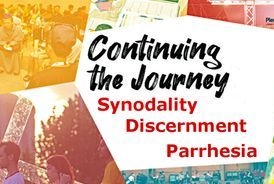
Catholics for Renewal
Subtitle
EDITORIAL September 28 2021

5th Plenary Council: what hope for success?
Just days away
the 5th Plenary Council of Australia will open on October 3rd with a Solemn Mass
and mixed expectations. For over it hangs a critical question: can it deliver
the much-needed renewal of a drifting and wounded Church gone off mission?
While many are optimistic, many others are sceptical, doubting the determination for renewal, especially among the bishops.
There is now universal agreement
that the Church in Australia has gone ‘off mission’ and is in crisis. The
recent Royal Commission into Institutional Responses to Child Sexual Abuse exposed
gross and systemic failures which shocked the nation. So the Australian bishops’
decision to convene the first plenary council in over 80 years brought relief
and hope.
The Council’s launch at Pentecost 2018
generated further hope when Catholics were invited to respond to the question: What do you think God is asking of us in Australia
at this time? The 200,000 Catholics
who responded in 17,500
submissions demonstrated their eagerness to participate.[1] They identified over 100 issues needing reform,
with a handful standing out.
But that hope has since been dampened by the bishops’ calculated attempt to assert uber control over its workings: by stacking their delegates with diocesan employees, by delaying publication of the governance report The Light from the Southern Cross , and by offering disappointing official preparatory documents: the 6 Discernment Papers, the Instrumentum Laboris and the Agenda. An exclusively online 1st Session of the Council has added to concern.
So what are Catholics for Renewal’s
hopes for the Council?
It believes that the roadmap for renewal depends on three essentials: synodality, discernment and parrhesía.
Synodality
Synodality is the ecclesial way of proceeding. St Cyprian of Carthage advised: “Do nothing without the council of presbyters and deacons and the consensus of the people”.
Vatican II called for “the venerable
institution of synods and councils to flourish with new vigour” (Christus Dominus, 36). Pope Francis’ insists that synodality is “an essential dimension of the Church….precisely the
path which God expects of the Church of the third millennium.”
St John Henry Cardinal Newman spoke of conspiratio - the essential
relationship of ‘co-spiritedness’ between bishops and people wherein the Church
best understands itself and its evangelical mission and is most
effective. He insisted that, though the teaching and governing roles of
hierarchy are distinct, they are complementary, interdependent, and in a dynamic
relationship he called the consensus
fidelium or communis fidelium sensus - ‘the collective sense of the faithful’, for it is “the Church, as a whole, which cannot err in
matters of belief” (Lumen Gentium,12) and bears
witness to the same truth.
Synodality derives from baptism, which introduces everyone to the community animated by the Spirit. The dynamics of the system operated by the Spirit are short-circuited if any part of the community - laity or hierarchy - is denied its proper role in the structures and processes of ecclesial discernment. The community is denied access to the diversity of cultures, charisms, gifts and ministries essential to its life.
Since its inception in 2011, Catholics for Renewal has constantly advocated for synodality and synods. In its 2011 Open Letter to Pope Benedict and the Australian Bishops, it called on “each diocesan bishop to convene at an early date a synod in his diocese to discuss how the local Church might be a more authentic witness in the 21st century”, and in 2012 urged the Australian bishops to “seriously consider the need and usefulness of convening a Plenary Council for the sake of ensuring that the pastoral needs of the People of God in Australia are provided for”, proposing it be held in 2015. Over time there have been some positive responses.
If this Council is to succeed there has to be genuine synodality: a real willingness to LISTEN and to dialogue with everyone.
Discernment
The second element is discernment.
The bishops’ invitation to Catholics to participate in the ‘dialogue and discernment’ phase was a huge – and decades overdue - innovation for the Church in Australia. Their response showed how welcome it was.
Catholics for Renewal saw the invitation as a graced opportunity, felt the need to respond, and discerned what it believed was needed to get the Church back ‘on mission’. It made 115 recommendations on rights of the faithful, church governance, pastoral leadership, parish ministry, and council processes. Among them were calls for individual bishops to convene diocesan synods or assemblies prior to the Council, and for the Council to legislate for minimum 5-yearly diocesan synods with maximum diversity of membership, frequent diocesan assemblies, and plenary councils every 15 years at least.
There are strong and differing views on the priorities for church renewal. Finding a path through the inherent tensions to a consensus will be messy and difficult, but possible, with continual discernment under the Spirit’s guidance.

Parrhesia
Parrhesía means speaking with frankness, lucidity, and boldness. In ancient
Greece, parrhesía was a civic virtue encouraging citizens to speak the truth
freely for the common good, not only by natural right, but also as a civic
obligation, even at personal risk.
In
the Gospels, when Jesus was intimidated, he spoke
‘openly’. When the Jewish authorities interrogated Peter and John, they were
amazed “when they saw [their] boldness (“bold
speech” parrhesia) and realised that
they were uneducated and ordinary men” (Acts
4:13).
Parrhesía is an essential virtue of discipleship and apostolic witness to Christ (Acts 4: 29, 31). It was starkly evident at the first Council when the Apostles Peter, James and Paul and the Jerusalem elders met to discuss the Gentile question (Acts (15: 6-29; Galatians 2: 1-21). Paul and Peter were frank and open in their confrontation.
Pope Francis constantly encourages open
discussion and refuses to silence dissent. He urges individuals to
speak their minds because he believes in a synodal church and trusts that the
Holy Spirit will guide it: “Open and fraternal debate makes theological and
pastoral thought grow. That doesn’t frighten me. What’s more, I look for it.”
At assemblies of the Synod of Bishops he invites them to speak boldly,
even if they think he might not want to hear what they have to say.
Catholics for Renewal has always tried to speak to the bishops openly, frankly, and respectfully. It urged them:
- to seek a dispensation from the restrictive c. 443 §4 so that more women members could be called to the Council;
- to stop using the term ‘delegate’ and replace it with ‘member’;
- to change Statute 20 requiring all Council members to take the onerous ‘Oath of Fidelity’ and allow most to make the simple ‘Profession of Faith’ encouraging them to speak freely;
It was critical of:
- the Instrumentum Laboris for its lack of parrhesía which Australian Catholics were entitled to expect of it.;
- the Council Agenda for failing “to take the priorities and proposals of Australian Catholics seriously” and for offering “little more than a collage of vague generalities focused almost exclusively on internal church issues, with little concern for the social, human rights and cultural issues swirling about the world”; and
- expressed real concern that the ‘concrete proposals of members’ may not include calls for substantial, even radical change.
If Council members are unhappy with the Agenda as it stands, Catholics for Renewal has encouraged them not to applaud when it is officially presented for their approval but to, then and there, question its fitness for purpose.
Parrhesia
requires not only honesty, but courage. If Council
members speak openly and frankly according to their conscience it may startle some
who will have to listen to something they
may not wish to hear. But if what needs to be said comes from the Spirit, its
utterance will give this Plenary Council its best hope of an
outcome “decided by the Holy Spirit and ourselves” and agreed to by “the whole
church” (Acts 15:28).
[1] The circa 200,000 Catholic respondents equates to 3.8% of all Catholics (5,289,624) and 32% of regular Mass attenders (623,376), assuming they are all in this group.
Image 1: Plenary Council image as modified
Image 2: Parrhesia - Aspasia debating with Socrates